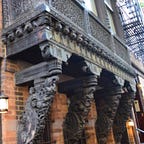after charlottesville- a response
The first time I heard the word Shoah (Holocaust, referring to the Nazi’s systemic mass murder of millions of folks from targeted populations and the genocide of millions of European Jews), I was in high school, watching a documentary of the same name. Then a good Catholic girl (I have since converted to Judaism), I was shocked, angered, and appalled: I had no words for the dehumanization, the violence, the destruction of entire families, entire villages, an entire way of life. How could I not have known that human beings were capable of such hatred?
The truth is, I hadn’t known because it didn’t affect me, my friends, my family.
Shock is certainly an understandable response to the vitriol, the hatred, and the violence that erupted in Charlottesville, Virginia, over the past weekend, when White Supremacists waving Nazi symbols and chanting racist, anti-Black, and anti-Semitic slogans marched into the streets, killing a peaceful counter-protester. It’s okay to feel shocked, angry, and threatened. Many, though not all, White American Jews have lived for decades now in security and prosperity, the shadow of anti-Semitism something that only touches our cousins in other regions of the world, or that defines our family origin stories.
But for folks of color (Jewish and non-Jewish), the morning after Charlottesville was not characterized by shock. Anger, perhaps. Fatigue and fear. But not shock: This horrifying, divided America, in which folks who hold unapologetically racist views feel absolutely no fear of social or legal stigma or punishment, is the America they inhabit daily.
So what do we do, as a community, after Charlottesville?
feel.
The prophet Amos tells us, “Hate evil, and love good, and establish justice in the gate” (Amos 5:15).
In order to hate evil and do good, we must first allow ourselves those first feelings of shock, anger, fatigue, fear, disgust. There must be room in our community for our feelings of disbelief at hearing Americans refer baldly and in public to “killing Jews.” There is a very real fear in our community, with the memories of murdered ancestors and traumatized parents and grandparents. We ought to pay attention to our emotional needs, seek help from friends and experts, and find appropriate release for our sadness and anger. In order to hate evil, we must feel the bile rise in our throats, and we must name that evil: Anti-Semitism. Racism. White Supremacy.
learn.
We must also learn. We must not step up and speak out only because this time they’re coming for us, issuing threats against Virginia synagogues and our colleagues and friends at UVA Hillel. We must learn about the history of White Supremacy in our own country. And we must be willing to make repair for the ways in which we have contributed to the bolstering of systemic racism. Coalition building will be key. Start small, and keep building.
And I know it is frustrating, disappointing, and triggering when coalitions seem to fail. The March for Racial Justice, scheduled to take place on Yom Kippur, is one of those failures — acknowledged as “a grave and hurtful mistake” by its organizers. But we must first look inwardly and ask: If I occupy a position of privilege (as, for example, a White Jew), have I done everything I can to educate myself, to widen the scope of my sources of news and information, to witness the realities facing people of color? Am I literate not only on the history of anti-Semitism, but on the history of racism? Am I taking an appropriate role at the table when marches like this are conceived and planned?
act.
And what can I, one person, do?
After you have taken the time to feel and the initiative to learn, act. Act in whatever way reflects your own passions and capabilities. We have a few suggestions, culled from POC-led and Jewish organizations and communities in Charlottesville:
give
- Support the Charlottesville NCAAP chapter and the Southern Poverty Law Center in the collective fight against hate and racism.
- The University of Virginia’s Hillel has received threats of violence,and is incurring cost to increase security. Support their work.
speak out
- Use your social networks to amplify the voices of Jews and people of color fighting against Nazism, White Supremacy, and Racism. Through organizations like T’ruah (the Rabbinic Call for Human Rights) and Jews for Racial and Economic Justice (JFREJ), keep informed about opportunities to influence public officials regarding anti-racist actions.
pray with your feet
- On Yom Kippur, many Jews around the world will be observing the holiest day of our calendar, fasting and seeking repentance. Some may choose to attend the March for Racial Justice in Washington, DC, seeing it as a chance to “pray with your feet.” Whatever choice is right for you, know that we at the Bronfman Center will be holding Yom Kippur services as usual, with attentiveness to those marching for justice. There are plans in the works for a solidarity March on Sunday, October 1, in New York City, and accommodations for Jews who want to both observe the holiday and participate in the march in some way. See the official march site for details.
The Bronfman Center will be reaching out in the coming weeks to build and strengthen ties with communities of color on campus, seeking an appropriate and productive forum for us to feel and learn together.
Establishing justice in the gates means proactively ensuring that those on the margins are at the center of our struggle for fairness, dignity, and equity. Establishing justice in the gates means putting the best of our community, the best of our humanity, at the intersection where kin and stranger meet, feel, learn, and act.
Rabbi Nikki DeBlosi is the Senior Jewish Educator and Reform Rabbi at the Edgar M. Bronfman Center for Jewish Student Life at New York University.
